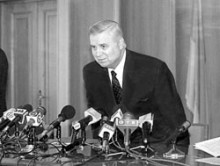“The new page will have fewer words, but they will be written correctly,” Foreign Minister Anatoly Zlenko said, addressing on January 23 a press conference on Ukrainian foreign policy in 2001. According to his, the time of diplomatic breakthroughs is coming to a close, giving way to routine painstaking work aimed at the pragmatic defense of Ukraine’s national interests. The Ministry of Foreign Affairs will carry out a structural and cadres reform in order to approach “the European dimension.” There will be no more debates on a “multivectored policy,” because a choice has been made in favor of European integration. Moving in three directions simultaneously is out of the question. Foreign policy must become more transparent to society. What should lay the groundwork for Ukraine’s foreign policy, the minister thinks, is “tough pragmatism” aimed at concrete results and a more economy-oriented approach now being worked out by the ministry. Ukraine is also “prepared for an ‘offensive defense’ of the interests of its state, business circles, citizens, and compatriots.” One of the new initiatives, according to Mr. Zlenko, will be about “the envoys of Ukrainian business.”
The traditional criticism of one’s predecessor looks like a thing of the past, at least in Mr. Zlenko’s case. He only dropped a gentle hint that it is not worth setting oneself illusory and unattainable goals, that there will be no more breakthroughs, and that foreign policy should be consistent with domestic policy, systematic, and avoid extremes.
Moreover, Mr. Zlenko promised more active cooperation with the countries of the Near and Middle East, Africa, Asia, and South America, which until recently has been only declarative. The first steps in this direction are already being taken: Ukraine is opening diplomatic offices in Iraq and Libya. Ukrainian delegations in these countries, Mr. Zlenko said, are discussing exclusively future economic agreements with them, without touching on political cooperation. In addition, Ukraine is establishing the office of Special Envoy in the Middle East.
Relations with the European Union, the United States, and Russia have been singled out as the three main directions. In addition, the minister added, relations with Russia are only now rising to the appropriate level. And only now are the two parties developing mutual trust without which Ukraine’s integration into Europe would be impossible. Incidentally, in Mr. Zlenko’s opinion, there cannot be too many strategic partners, but he considers Poland as currently by far Ukraine’s most important strategic partner. It is also planned to deepen Kyiv’s relations of partnership relations with Berlin, London, and Paris.
Another key direction Mr. Zlenko spoke about is the conversion of GUUAM into a full- fledged international organization. Also high on the agenda is restoring our image in the Council of Europe, a task far from easy just now.
Among other important foreign political actions and pressing tasks are visits by the Pope and the UN Secretary General (scheduled for late April) and the necessity to finish border delimitation negotiations with Russia and Rumania, let alone the establishment of contacts with the new US administration, although the Ambassador of Ukraine in the US, Kostiantyn Hryshchenko, for example, said at the same press conference that it is too early to speak about Washington’s tougher attitude toward Kyiv against the backdrop of an obviously cooled relationship between the US and Russia. Mr. Hryshchenko is convinced that Washington is not going back on its promises to offer further aid to Ukraine.
In general, Mr. Zlenko looked self-confident at the press conference and said all his plans in this office have so far been fulfilled. But it has become more than obvious that from now on foreign policy successes will depend not so much on the minister’s personality as on the domestic situation. And the latter is unlikely to be simple.







